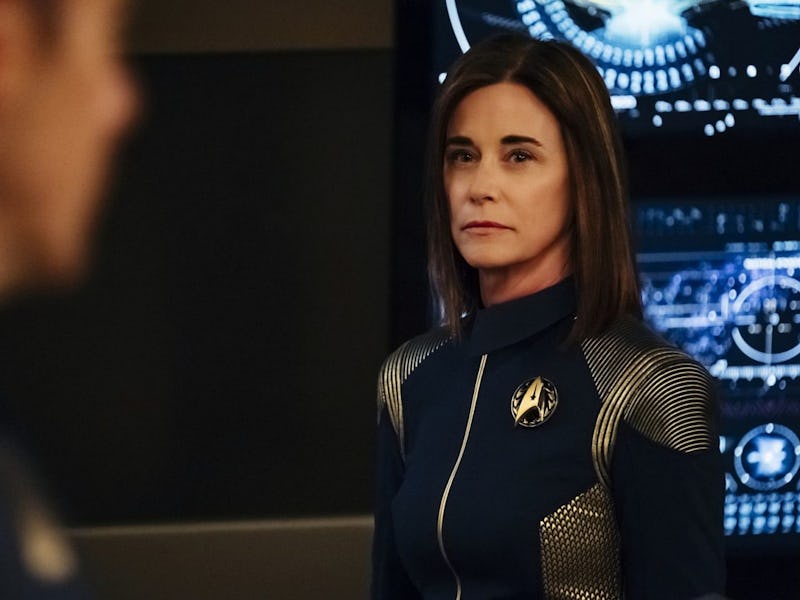'Star Trek: Discovery' Boldly Goes Where No Man Has Gone Before
"The writers didn’t sit down with a political agenda."

The future of feminism past this century might feel abstract, but when you have an infant daughter it feels more urgent. I’ve been a Star Trek fan since I was old enough to force my five-year-old fingers into the Vulcan salute, but as a father of a young girl, I’ve found its female-centric future suddenly more relevant than simple Trekkie self-indulgence. And that’s because powerful women in Star Trek: Discovery aren’t a gimmick, they are just a fact of life in a hopeful future.
Last weekend, Star Trek: Discovery aired its season finale in which nearly every single major power player — from the Klingon leader L’Rell, to Commander Michael Burnham, to Admiral Cornwell to Ensign Tilly, and even the Terran Philippia Georgiou — was a woman. But as Admiral Cornwell actress Jayne Brook points out, the refreshing elegance of this fact is that there wasn’t a big deal made out of it. It was just a given.
“What I love about it is that the writers didn’t sit down with a political agenda and just decide to write toward that,” Brook tells me. “But, they have created these women who are not only strong, but they are fully developed in every area of their lives. They’re not just defined in terms of who they are in relation to man. They’re not just somebody’s wife, or somebody’s daughter or somebody’s girlfriend. They’re tough, they’re strong, they’re smart.”
Sonequa Martin- Green as Commander Michael Burnham and Jayne Brook as Admiral Cornwell in the season one finale of 'Star Trek: Discovery'
Though science fiction, and Star Trek in specific, is often given a lot of credit for its political progressivism, it was difficult to find a version of Trek prior to Discovery which was able to breezily pass the Bechdel Test, writer Alison Bechdel’s measure a work of fiction by asking if there is at least one scene in which “at least two women who talk to each other about something other than a man.”
The relevant thing about the Benchdel Test is that it should be a relatively low bar for futuristic fiction to clear, which makes it all the more bizarre that something like Star Trek had a rough time passing it until Discovery became the sixth television iteration of the franchise.
Kate Mulgrew as Captain Janeway
True, though the Nineties gave us Captain Janeway (Kate Mulgrew) on Star Trek: Voyager, she was surrounded by mostly men, and since then, Star Trek had male-centered casts; both in the prequel series Enterprise, and the three “reboot” films.
Back in the Seventies, feminist Star Trek scholars knew the series had a long way to go. At that point, this optimistic beacon of hope had a male starship captain named Jim Kirk who acted a little like an outer space womanizer and chauvinist.
Star Trek Lives!
In their the 1975 essay collection, Star Trek Lives!, authors Jacqueline Linchenberg, Sondra Marshak and Joan Winston write, “some fans have said [Captain] Kirk’s repeated romances are Star Trek’s worst fault — the one thing that ought to be changed when the show is revived.”
Four decades later, that change has finally happened. Discovery contains none of the braggadocios baggage of the newer Star Trek reboot films or the original series. In trading Captain Kirk for the likes of Captain Philippa Georgiou and Admiral Cornwell, Star Trek: Discovery presents fully realized female role models for impressionable young women in a way the franchise has only sporadically achieved in the past.
“I played a lot of doctors and lawyers. Some crazy people. I never played someone who had to fight a Klingon,” Brook said and explained that she took on the role because “I liked the idea that this was a full, well-rounded character. It wasn’t a victim character.”
Michelle Yeoh as Philippa Georgiou
Discovery took a lot of heat from Star Trek fans early on in its run, not only for seemingly being too tonally downbeat, but for also killing off its powerful female Captain Georgiou in the pilot episode. But, as Bustle writer Casey Ciprani pointed out, it turns out that the show was feminist all along and “the promise of diversity and enhancing these great female characters means Discovery was doing the right thing all long, and just wanted to take us all along for its wild, exciting ride.”
At nine months, my daughter is obviously too young to watch any iteration of Star Trek, particularly not the thrilling fight scenes in Discovery. But, when I’ve been able to sneak the new episodes in-between her naps, I don’t feel like I’m indulging in a science fiction guilty pleasure. Instead, the women on Discovery, like Admiral Cornwell, embody a future I hope my daughter actually lives in. One in which she’ll be able to achieve her goals without her gender being a concern.
“They are putting women in these roles without making a huge comment on it,” Brook says. “And just saying, ‘this is what these women are capable of. Which is important. There has to be a different narrative has to be out there for people to see.”
Star Trek: Discovery Season One is streaming in its entirety on CBS All Access. It will return for a second season sometime in 2019.